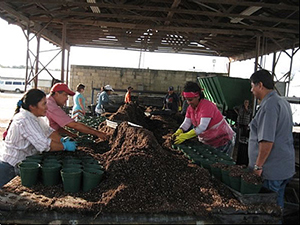Partnerships for Environmental Public Health (PEPH)
Academic Partner:
Emory University
Linda A. McCauley, R.N., Ph.D.
Community Partners:
Farmworker Association of Florida
Farmworker Health and Safety Institute

Project Description
Agriculture consistently ranks as one of the three most hazardous occupations in the United States, and the agricultural workforce includes significant numbers of women of childbearing age. In addition to potential exposures to agricultural chemicals, farmworkers also face ergonomic stressors like long hours of repetitive bending and standing and exposure to extreme heat and dehydration. Each of these factors has the potential to impact the health of pregnant women and their unborn children, yet few studies have examined the specific risks to pregnant women in this environment.
The farmworker community consistently has expressed concern over the association between their work and the health of their children. This led researchers from Emory University to partner with the Farmworker Association of Florida and the Farmworker Health and Safety Institute to examine the potential work hazards and exposures inherent to farm work that could affect the health of pregnant women. This partnership sought to promote healthy, protective behaviors of female farmworkers during pregnancy.
The project partners:
- Administered surveys to a sample of female nursery and fernery farmworkers in Central Florida. These showed that nursery workers were more likely to report health symptoms during their pregnancy than fernery workers.
- Observed a self-reported increased risk of respiratory illness in the first year of life for infants whose mothers worked in ferneries
- Found that biomarkers of organophosphate pesticides and the fungicide mancozeb were significantly higher in nursery workers than levels in fernery workers and the control group.
- Found that perceived pesticide exposure did not correspond to actual levels within differing agricultural subpopulations.
- Conducted five focus groups with 35 female Hispanic and Haitian nursery and fernery workers. These showed that participants believe that heat exposure can adversely affect general, pregnancy, and fetal health, yet feel they lack control over workplace conditions and that they lack training about these specific risks.
Both Hispanic and Haitian farmworker women of childbearing age were represented in the study population. The partners used their findings to develop culturally and linguistically appropriate educational materials to provide the women with information they need about chemical, ergonomic, and heat-related hazards. The materials emphasized health-promoting and protective behaviors during pregnancy, empowering the women to protect themselves and ultimately the health of their children. This work also included an evaluation that determined that educational and research objectives were achieved through this collaboration.
This project was funded by the National Institute for Occupational Safety and Health.
Selected Publications:
- Runkle J, Flocks J, Economos J, Tovar-Aguilar JA, McCauley L. 2014. Occupational risks and pregnancy and infant health outcomes in Florida farmworkers. Int J Environ Res Public Health 11(8):7820-7840. [Abstract Runkle J, Flocks J, Economos J, Tovar-Aguilar JA, McCauley L. 2014. Occupational risks and pregnancy and infant health outcomes in Florida farmworkers. Int J Environ Res Public Health 11(8):7820-7840.]
- Runkle JD, Tovar-Aguilar JA, Economos E, Flocks J, Williams B, Muniz JF, Semple M, McCauley L. 2013. Pesticide risk perception and biomarkers of exposure in Florida female farmworkers. J Occup Environ Med 55(11):1286-1292. [Abstract Runkle JD, Tovar-Aguilar JA, Economos E, Flocks J, Williams B, Muniz JF, Semple M, McCauley L. 2013. Pesticide risk perception and biomarkers of exposure in Florida female farmworkers. J Occup Environ Med 55(11):1286-1292.]
- Flocks J, Vi Thien Mac V, Runkle J, Tovar-Aguilar JA, Economos J, McCauley LA. 2013. Female farmworkers' perceptions of heat-related illness and pregnancy health. J Agromedicine 18(4):350-358. [Abstract Flocks J, Vi Thien Mac V, Runkle J, Tovar-Aguilar JA, Economos J, McCauley LA. 2013. Female farmworkers' perceptions of heat-related illness and pregnancy health. J Agromedicine 18(4):350-358.]


